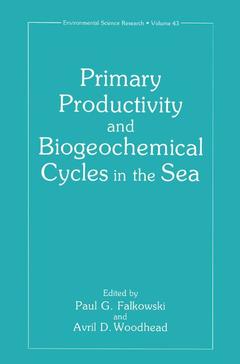Description
Primary Productivity and Biogeochemical Cycles in the Sea, Softcover reprint of the original 1st ed. 1992
Environmental Science Research Series, Vol. 43
Coordinators: Falkowski Paul G., Woodhead Avril D.
Language: English
Subject for Primary Productivity and Biogeochemical Cycles in the Sea:
Publication date: 06-2013
550 p. · 15.5x23.5 cm · Paperback
550 p. · 15.5x23.5 cm · Paperback
Description
/li>Contents
/li>
Biological processes in the oceans play a crucial role in regulating the fluxes of many important elements such as carbon, nitrogen, sulfur, oxygen, phosphorus, and silicon. As we come to the end of the 20th century, oceanographers have increasingly focussed on how these elements are cycled within the ocean, the interdependencies of these cycles, and the effect of the cycle on the composition of the earth's atmosphere and climate. Many techniques and tools have been developed or adapted over the past decade to help in this effort. These include satellite sensors of upper ocean phytoplankton distributions, flow cytometry, molecular biological probes, sophisticated moored and shipboard instrumentation, and vastly increased numerical modeling capabilities. This volume is the result of the 37th Brookhaven Symposium in Biology, in which a wide spectrum of oceanographers, chemists, biologists, and modelers discussed the progress in understanding the role of primary producers in biogeochemical cycles. The symposium is dedicated to Dr. Richard W. Eppley, an intellectual giant in biological oceanography, who inspired a generation of scientists to delve into problems of understanding biogeochemical cycles in the sea. We gratefully acknowledge support from the U.S. Department of Energy, the National Aeronautics and Space Administration, the National Science Foundation, the National Oceanic and Atmospheric Administration, the Electric Power Research Institute, and the Environmental Protection Agency. Special thanks to Claire Lamberti for her help in producing this volume.
Honorary Lecture.- Towards Understanding the Roles of Phytoplankton in Biogeochemical Cycles: Personal Notes.- Factors Limiting Primary Productivity in the Sea I. Light.- The Nature and Measurement of the Light Environment in the Ocean.- The Functional and Optical Absorption Cross-Sections of Phytoplankton Photosynthesis.- Molecular Ecology of Phytoplankton Photosynthesis.- Factors Limiting Primary Productivity in the Sea II. Nutrients.- Nutrient Limitation and Marine Photosynthesis.- Geological and Climatic Time Scales of Nutrient Variability.- Nutrient Limitation of New Production in the Sea.- Iron as a Limiting Factor in Oceanic Productivity.- Estimation of Global Ocean Production.- Satellite Ocean Color Observations of Global Biogeochemical Cycles.- Advances in Understanding Phytoplankton Fluorescence and Photosynthesis.- Bio-Optical Models and the Problems of Scaling.- The Role of Marine Organisms in Primary Production.- Phytoplankton Size.- Productivity of Seaweeds.- Productivity of Zooxanthellae and Biogeochemical Cycles.- New Production and Biogeochemical Cycles.- The Importance and Measurement of New Production.- The Role of Coastal High Latitude Ecosystems in Global Export Production.- Tracer-Based Inferences of New Primary Production in the Sea.- New Production and the Global Carbon Cycle.- Loss Processes and Material Recycling.- Respiration: Taxation Without Representation?.- Bacterioplankton Roles in Cycling of Organic Matter: The Microbial Food Web.- Regeneration of Nutrients.- Grazing, Temporal Changes of Phytoplankton Concentrations, and the Microbial Loop in the Open Sea.- Phytoplankton in the Global Content.- Biosphere, Atmosphere, Ocean Interactions: A Plant Physiologist’s Perspective.- Reading the Sedimentary Record of the Ocean’s Productivity.-Do Marine Phytoplankton Influence Global Climate?.- Participants.
© 2024 LAVOISIER S.A.S.




